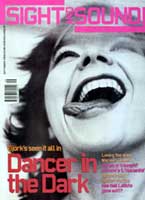Primary navigation

France 1999
Reviewed by Ginette Vincendeau
Our synopses give away the plot in full, including surprise twists.
Paris, the present. Though successful at work, a middle-aged executive, working in IT, has been living a socially and sexually barren life ever since his partner left him. This nameless protagonist loses his car, visits a client who stands him up, has dinner with a priest friend and visits a department store. At various points, he takes sleeping pills, watches porn, masturbates and vomits. He also fantasises about his female colleagues.
On a trip to western France with a colleague, Tisserand, the hero has a mild heart attack, but recovers. Both men fail to pick up women. The hero buys a knife and incites Tisserand to rape a young woman making love with her partner in the sand dunes, then to kill the couple. Tisserand can't go through with it. Later, Tisserand is killed in a car crash unwittingly caused by the hero's call to his mobile phone. The hero goes back to work but sinks into deeper depression. After he has violent fantasies about mutilated women, he checks into a clinic. A female psychiatrist fails to get through to him. He is last seen taking dancing lessons and smiling at his pretty female partner, who smiles back at him.
Whatever is closely based on a novel by Michel Houellebecq, one of France's literary sensations in the 90s. Houellebecq is best known for his later book, Les Particules élémentaires - fleetingly alluded to in the film - which created an enormous stir with its deep pessimism, obscenity and mercilessness. While Houellebecq is mainly criticised for his misogyny, his hatred is not confined to women, and he has made political incorrectness his credo: "It is true that gays exasperate me, just as blacks, ecologists, dykes and so on get on my nerves..." he has said. "Each time I see tribal behaviour I become sarcastic and vicious." Even in its moments of intended comedy, the film taps into this sensibility. At one point, the hero slaps a woman who asked him to put out his cigarette, provoking hilarity among the other characters. The presentation of the woman as a prissy frump clearly invites the spectator to side with the hero.
Philippe Harel, known in France for his 1997 hit comedy Les Randonneurs (about a hiking trip in Corsica) at first seems an odd choice for directing, and starring in, a Houellebecq adaptation. Until, that is, one sees pictures of Houellebecq and Harel - both dark, slim middle-aged men with a receding hairline. French reviewers have all noted how Harel, who plays the hero in the film, adopts Houellebecq's mannerisms, including his idiosyncratic way of holding his cigarette. And like Harel's 1998 feature, La Femme défendue, Whatever sticks determinedly to a first-person male perspective, with long stretches of the film overlaid with extracts of Houellebecq's writing.
Given its literary, solipsistic nature, Houellebecq novel doesn't lend itself to film adaptation. Thanks to the director's gloomy performance and José Garcia's moving turn as the hero's colleague Tisserand, Harel doesn't entirely fail in his ambitious enterprise. There are also a few funny vignettes where Harel's comic talent as a director surfaces, notably, the cringingly embarrassing training sessions the hero and Tisserand conduct, or their doomed attempts to pick up women in grim provincial bars. But such sharp scenes are mere comic relief in Houellebecq's grand pessimistic narrative where everybody - especially women - and everything is a target for the hero's ennui and disgust.
Embedded in this totalising malaise is a theory: ultra-liberal capitalism is paralleled by (and perhaps has produced) a similarly deregulated sexual economy; here, there are the ultra-rich (those with a varied, exciting sexual life) and the ultra-poor (those with none). The notion that the new 'free' sexual mores entail an inexorable extension of the sexual battle (which the film's French title Extension du domaine de la lutte, loosely translated as 'Extending the battle', makes clear) is an interesting insight. The film's early representation of the hero's face superimposed on a soulless high-rise block, its wicked satire of the corporate world and of a harsh society (motorists fail to stop when the sick hero is on the brink of collapse in the streets of Rouen) provide a considered grounding to this analysis.
However, this reasoning is viewed from a wholly male perspective, one in which women are described verbally and visually in terms of their genitalia, or "hole" as it's referred to. "How can one forget the vacuity of a vagina?" intones the hero who vomits after fantasies of, or encounters with, women. The voiceover resonates with a backlash sensibility: "Men," he says, "are the ultimate residues of the feminist fallout." And as these women withhold their sexuality from the hero and his friend, the 'solution' (which isn't presented as entirely fanciful) is to grab it back from them violently. In this respect, Whatever would seem to fit in with recent French films such as Seul contre tous and Baise-moi, in which sex and violence are linked in a seemingly inescapable dynamic. So while the film presents a subversive stance by featuring quotes by radical philosophers (Schopenhauer, Kant) and pushes censorship boundaries through its inclusion of pornographic imagery, it ends up supporting a reactionary analysis of social relations and advocating mindless violence.
Unlike Seul contre tous and Baise-moi, however, Whatever confines its violence to fantasy and would seem to provide a glimpse of hope at the end. But after an hour and 45 minutes of self-indulgent pessimism (or "depressionism" - a word which has been applied to Houellebecq), of unrelenting misogyny and misanthropic ranting, what weight can we give to the final images of an apparently content hero smiling sweetly at his dancing partner?